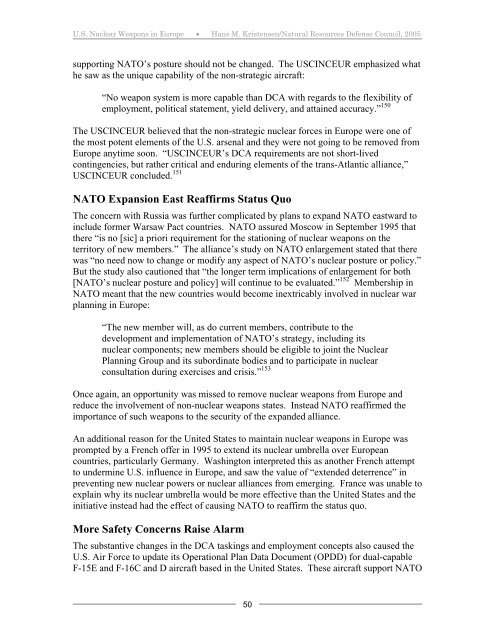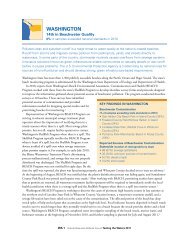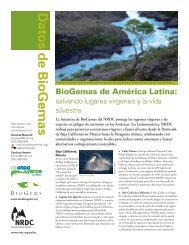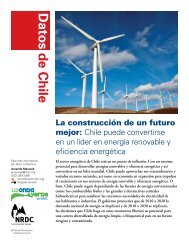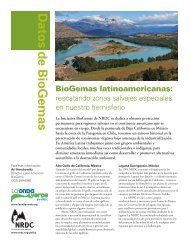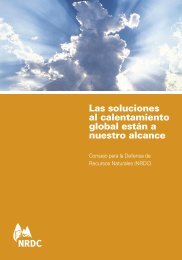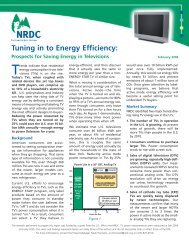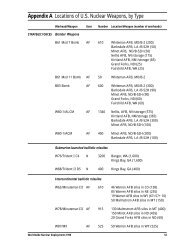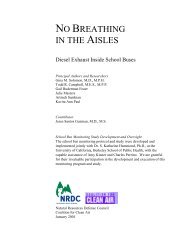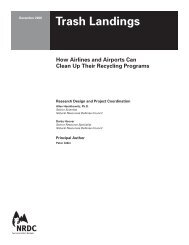US Nuclear Weapons in Europe - Natural Resources Defense Council
US Nuclear Weapons in Europe - Natural Resources Defense Council
US Nuclear Weapons in Europe - Natural Resources Defense Council
You also want an ePaper? Increase the reach of your titles
YUMPU automatically turns print PDFs into web optimized ePapers that Google loves.
U.S. <strong>Nuclear</strong> <strong>Weapons</strong> <strong>in</strong> <strong>Europe</strong> • Hans M. Kristensen/<strong>Natural</strong> <strong>Resources</strong> <strong>Defense</strong> <strong>Council</strong>, 2005<br />
support<strong>in</strong>g NATO’s posture should not be changed. The <strong>US</strong>CINCEUR emphasized what<br />
he saw as the unique capability of the non-strategic aircraft:<br />
“No weapon system is more capable than DCA with regards to the flexibility of<br />
employment, political statement, yield delivery, and atta<strong>in</strong>ed accuracy.” 150<br />
The <strong>US</strong>CINCEUR believed that the non-strategic nuclear forces <strong>in</strong> <strong>Europe</strong> were one of<br />
the most potent elements of the U.S. arsenal and they were not go<strong>in</strong>g to be removed from<br />
<strong>Europe</strong> anytime soon. “<strong>US</strong>CINCEUR’s DCA requirements are not short-lived<br />
cont<strong>in</strong>gencies, but rather critical and endur<strong>in</strong>g elements of the trans-Atlantic alliance,”<br />
<strong>US</strong>CINCEUR concluded. 151<br />
NATO Expansion East Reaffirms Status Quo<br />
The concern with Russia was further complicated by plans to expand NATO eastward to<br />
<strong>in</strong>clude former Warsaw Pact countries. NATO assured Moscow <strong>in</strong> September 1995 that<br />
there “is no [sic] a priori requirement for the station<strong>in</strong>g of nuclear weapons on the<br />
territory of new members.” The alliance’s study on NATO enlargement stated that there<br />
was “no need now to change or modify any aspect of NATO’s nuclear posture or policy.”<br />
But the study also cautioned that “the longer term implications of enlargement for both<br />
[NATO’s nuclear posture and policy] will cont<strong>in</strong>ue to be evaluated.” 152 Membership <strong>in</strong><br />
NATO meant that the new countries would become <strong>in</strong>extricably <strong>in</strong>volved <strong>in</strong> nuclear war<br />
plann<strong>in</strong>g <strong>in</strong> <strong>Europe</strong>:<br />
“The new member will, as do current members, contribute to the<br />
development and implementation of NATO’s strategy, <strong>in</strong>clud<strong>in</strong>g its<br />
nuclear components; new members should be eligible to jo<strong>in</strong>t the <strong>Nuclear</strong><br />
Plann<strong>in</strong>g Group and its subord<strong>in</strong>ate bodies and to participate <strong>in</strong> nuclear<br />
consultation dur<strong>in</strong>g exercises and crisis.” 153<br />
Once aga<strong>in</strong>, an opportunity was missed to remove nuclear weapons from <strong>Europe</strong> and<br />
reduce the <strong>in</strong>volvement of non-nuclear weapons states. Instead NATO reaffirmed the<br />
importance of such weapons to the security of the expanded alliance.<br />
An additional reason for the United States to ma<strong>in</strong>ta<strong>in</strong> nuclear weapons <strong>in</strong> <strong>Europe</strong> was<br />
prompted by a French offer <strong>in</strong> 1995 to extend its nuclear umbrella over <strong>Europe</strong>an<br />
countries, particularly Germany. Wash<strong>in</strong>gton <strong>in</strong>terpreted this as another French attempt<br />
to underm<strong>in</strong>e U.S. <strong>in</strong>fluence <strong>in</strong> <strong>Europe</strong>, and saw the value of “extended deterrence” <strong>in</strong><br />
prevent<strong>in</strong>g new nuclear powers or nuclear alliances from emerg<strong>in</strong>g. France was unable to<br />
expla<strong>in</strong> why its nuclear umbrella would be more effective than the United States and the<br />
<strong>in</strong>itiative <strong>in</strong>stead had the effect of caus<strong>in</strong>g NATO to reaffirm the status quo.<br />
More Safety Concerns Raise Alarm<br />
The substantive changes <strong>in</strong> the DCA task<strong>in</strong>gs and employment concepts also caused the<br />
U.S. Air Force to update its Operational Plan Data Document (OPDD) for dual-capable<br />
F-15E and F-16C and D aircraft based <strong>in</strong> the United States. These aircraft support NATO<br />
50


